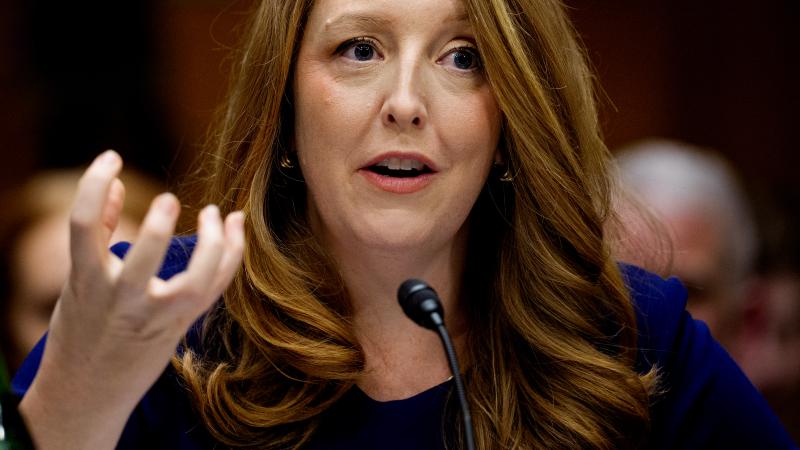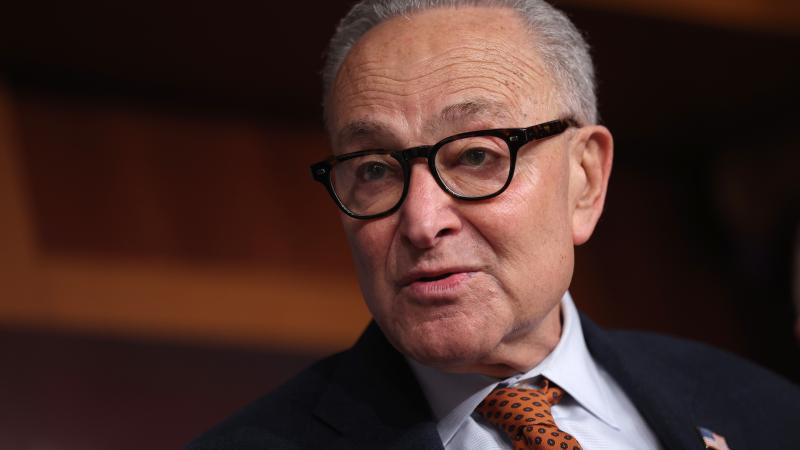Biden policy freed $70 billion in funds for Iran, which is eyeing retaliation against Israel, U.S.
The extra cash influx for the Islamic regime has coincided with its proxies' continued strikes against U.S. bases and support for terror groups in their fight against Israel.
As the Middle East braces for yet another retaliatory strike on Israel from Iran, critics have flagged a Biden administration policy that freed up an estimated $70 billion in funding for the Islamic theocracy since it took office.
The cash provides extra breathing room for the Islamic regime, which has coincided with its proxies' continued strikes on U.S. bases and support for terror groups in their fight against Israel.
On Monday, U.S. troops at the Al Assad Airbase in Iraq were injured after a reported attack by Iranian-backed militant groups, the BBC reported. The attack is likely only the first in a series of retaliatory actions planned by the Islamic Republic of Iran and its militant proxies in response to Israel’s assassination of Hamas leader Ismail Haniyeh, who was killed in the Iranian capital of Tehran while attending the inauguration of the country’s new president.
Last week, Iran’s Supreme Leader, Ayatollah Ali Khamenei, vowed “harsh punishment” for the assassination.
Scrambling to deescalate
Biden administration officials are reportedly scrambling to deescalate the situation to prevent an all out retaliation by Iran similar to its unprecedented missile attack on the Jewish country in April.
“We are engaged in intense diplomacy pretty much around the clock with a very simple message: All parties must refrain from escalation,” said Secretary of State Antony Blinken on Monday according to AFP. “It’s also critical that we break this cycle by reaching a cease-fire in Gaza.”
Critics believe the Biden Administration’s policies have encouraged and facilitated Iran’s behavior in the Middle East, putting U.S. troops and ally Israel in danger.
Biden rescinded Trump's "maximum pressure" plan
Since taking office, the Biden administration’s policy aims to fold Iran back into a regional order pioneered by the Obama administration that centered on the Joint Comprehensive Plan of Action (JCPOA)—colloquially referred to as the Iran nuclear deal. To do this, Biden ordered the reversal of nearly all of former President Donald Trump’s policies—dubbed “maximum pressure”—on the theocratic regime.
In one of his first acts after the inauguration, President Biden rescinded U.N. sanctions on the country which were reimposed by former President Trump’s administration after he withdrew the United States from the Iran nuclear deal, citing violations.
This first round of sanctions relief was only the first in a series of policies that have freed the hostile Iranian regime to continue to pursue its clandestine nuclear program, fund a web of proxy militias across the Middle East, and threaten U.S. troops in the region.
Victoria Coates, former deputy national security adviser to Trump and current vice president at the Kathryn and Shelby Cullom Davis Institute for National Security and Foreign Policy at the Heritage Foundation, says the Obama-Biden Iran policies have provided the resources for the regime to fund its military activities, even indirectly.
“We know for a fact they would not because you can trace the money that they got under the Obama era nuclear deal, it went dollar for dollar into their, into their military activities. And as President Trump went through the maximum pressure campaign squeezed out that money, and we took them down to somewhere around 200-300,000 barrels [of oil] per day. They got below their ability to sustain themselves,” Coates told the "John Solomon Reports" podcast.
“And that was, of course, turned the other way, when Biden and Harris came in. They're now over 2 million barrels a day. They're 10 times what they were under President Trump. And guess what they're spending that money on?” she added.
Biden allows Iran access to $10 billion
In fact, the Biden administration has opened up funds for the regime at multiple opportunities during the last four years, amounting to a more than $70 billion windfall for the country’s leadership.
As recently as March, the Biden administration renewed a sanctions waiver allowing Iran to access more than $10 billion in frozen funds sourced from Iraqi payments for Iranian electricity. The administration previously approved the sanctions waiver in November. Previously, from 2018 to 2023, the State Department had approved waivers that allowed Iraq to import electricity from its neighbor, but prevented Iran from having access to the revenue.
The Biden State Department insisted at the time that the funds could only be used to purchase humanitarian goods—like food and medicine—and thus, posed no danger. “Under these waivers, no money has been permitted to enter Iran," a State Department spokesperson told the Washington Free Beacon in March. "Any notion to the contrary is false and misleading.”
However, Iran has a documented history of diverting humanitarian aid resources to benefit other goals of the regime, including its support of militant proxy groups in the wider region.
Lax enforcement of oil sanctions
In 2018 the Treasury Department found that Iran used a purported medical company to benefit from an illicit oil trade with Syria. This trade would ordinarily be blocked by sanctions. The Assad regime ruling Syria in return helped to facilitate millions of dollars in funding for the Iranian revolutionary guard, Hamas, and Lebanese Hezbollah.
This is not the only way that Biden administration policies have increased Iran’s cash flow. Experts believe the administration’s lax enforcement of oil sanctions against the country has led to a windfall of funds that would not have materialized under President Trump’s more aggressive application of sanctions.
Two Iran experts calculated that since Biden’s inauguration the lax oil sanctions enforcement has resulted in $32 billion in excess revenue that it otherwise would not have had access to.
Iran reaches export milestone under Biden
Saeed Ghasseminejad and Behnam Ben Taleblu, experts at the Foundation for Defense of Democracies who wrote in The Dispatch about Iran’s access to funds, said some of Iran’s other, non-oil exports have also grown despite being subjected to sanctions as well. According to Iranian state media, the country’s non-oil exports exceeded $53.16 billion—the highest value ever—in fiscal year 2023.
This marked an abrupt shift in the export trends between the Trump and Biden administrations. Exports declined in 2019 and 2020 by 17.3 and 12.8 percent, but increased by 5.2 and 8.2 percent in 2021 and 2022, according to the researchers.
Despite the Biden administration’s efforts to induce Iran back to the negotiating table on the nuclear deal, the regime has increased its stockpiles of near-weapons grade uranium to a level that could produce several nuclear bombs, according to a International Atomic Energy Agency report. The country continues to insist, however, that it is pursuing nuclear technology for peaceful purposes.
The Facts Inside Our Reporter's Notebook
Links
- braces for yet another retaliatory strike on Israel
- estimated $70 billion
- the BBC reported
- killed in the Iranian capital of Tehran
- said Secretary of State Antony Blinken
- rescinded U.N. sanctions
- Kathryn and Shelby Cullom Davis Institute for National Security and Foreign Policy
- access more than $10 billion in frozen funds
- Iran used a purported medical company to benefit from an illicit oil trade
- Saeed Ghasseminejad
- Behnam Ben Taleblu
- who wrote in The Dispatch about Iranâs access to funds
- increased its stockpiles of near-weapons grade uranium
















